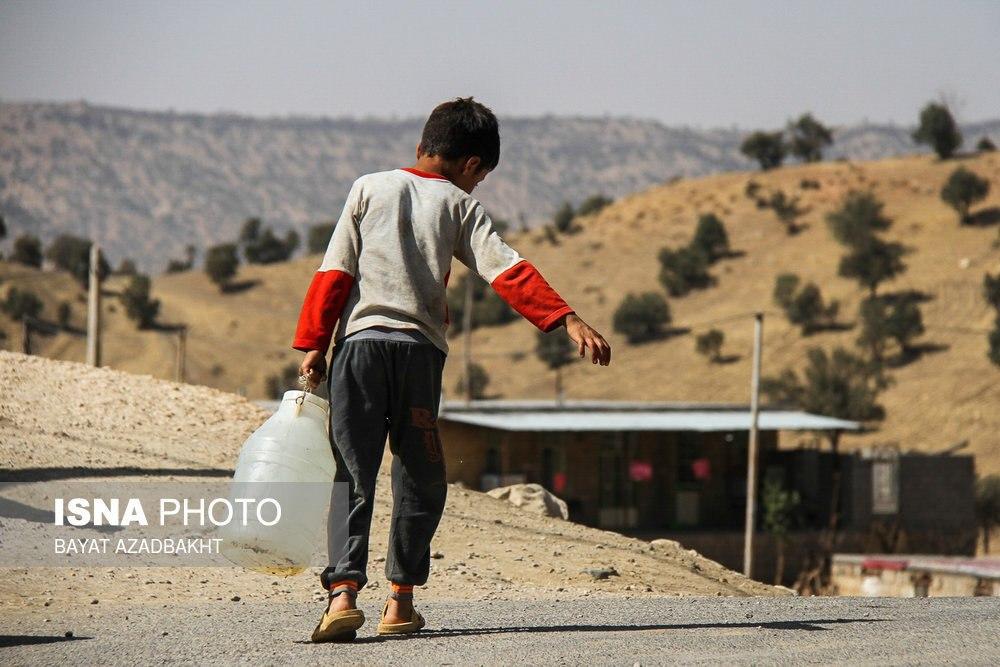On Monday, people of Gheyzanieh village in Khuzestan were waiting to receive potable water from tankers; however, as a member of the rural council says, “Officials didn’t keep their word and water tankers were not sent to the area.” Locals would even pay several times that of the real price of water to tanker owners to be able to save their cattle.
The Khuzestan governor announced more than three years ago that the problem of drinking water in the village would be solved, according to some Iranian media. However, the problem now remains. This issue prompted a rally by locals demanding authorities look into the matter.
Nevertheless, the event turned ugly as protesters blocked a road, so much so that a local police chief said two of the protesters had been wounded with rubber pellets shot by riot police.
Unofficial reports even talked of live bullets being fired at protesters. “People’s protest at [officials’] failure to provide them with potable water is a legal demand, but it should take place via legal channels,” said the police chief.
The problem of drinking water is not limited to Gheyzanieh only. The whole province is gripped by the problem. People in Dehdez village have also been grappling with water rationing for 15 years now.
The representative of the provincial capital of Ahvaz in the Parliament says a third of the problem is due to a shortage of fund, and the rest is related to the provincial water and sewage company, which picks the wrong contractors through “connections” rather than “rules and regulations.”
“They gave the water to contractors and we were left without water. We and our cattle are thirsty,” say residents of Gheyzanieh.
“If there are no finances to build the water distribution network in Gheyzanieh, then where all the money has come from to construct all these luxury and garden buildings located 100 kilometres from the village,” ask users of social networks.
“Don’t people of Gheyzanieh village have any share of the 750 active oil wells in their vicinity,” they also ask.
“We don’t approve of road blockages, but during the February elections, people went to the ballot boxes with empty barrels and voted in order to get officials to hear their voices; unfortunately, that voice was not heard by authorities, either,” says a member of a local council. He says protesters support the Establishment, but they do not have access to potable water.
“Now in 2020, prices have increased and they are facing problems with [shortages of] funds yet again,” says the head of a local village council, adding that the provincial governor had promised more than three years ago that a water distribution network would be built.
Water at High Prices
The area has a population of around 30,000.
“These people live near the provincial capital and an oil region which is home to many petrochemical installations and refineries. There are 750 active wells in the region, but people are thirsty due to a lack of finances,” said a member of a local council.
“A water distribution project was implemented incompletely for the first time in 2003. The materials used in pipes were not of good quality; moreover, water was pumped through pipes for only one hour just once a week, at most,” he said.
Officials Break Word Again
Another rural councilor also weighs in on the event.
“Officials and reporters had been there since morning, but water tankers were not sent. So, they all returned,” another local councilor tells Iran newspaper.
“Then the journalists filed their reports and returned to their workplace. People, too, left without water, have been waiting outside the installations building,” the councilor adds. “We used to have a piped network, which was completely cut off,” he says.
He says the agriculture department has a legal responsibility to provide water tankers for cattle, but has long failed to fulfil its duty,” he says.
“The water pipe in the village was an old one and stopped functioning. Local oil companies must provide finances for its repair and reconstruction, but they don’t,” he says.
According to this official, pipes are corroded and leaks water. Sometimes people use the water leaked from the pipes and running on the ground, “which has resulted in a skin disease spreading among them.”
“Twenty days ago, authorities from the local water and sewage department came here and asked us to give them some funds from the village’s budget, so that they would fix the network. We gave them Rls. 150 million. They fixed the network, but still water didn’t reach the village,” says the councilor.
President Orders Move to Supply Water
President Hassan Rouhani held separate conversations with Energy Minister Reza Ardakanian and Khuzestan Governor Gholam-Reza Shairati on Monday. During the talks, they discussed some of the problems locals are facing with regard to the supply of potable water. Accordingly, the president ordered the necessary measures be taken by relevant authorities to solve the problem as soon as possible.
“The governor, provincial officials and all pertinent institutions should make the necessary planning and arrangements to prevent problems and hardship for the people of Khuzestan in summer with regards to the supply of potable water, so that they will not face such problems,” said the president.
Water to Be Supplied in Two Weeks
On Monday, the Water and Sewage Department of Khuzestan province issued a statement, explaining the water problem in the region. It said the reason behind failure to supply water was a lack of finances to provide raw materials and produce pipes as well as protestors, who included farmers and some from other government institutions. The department announced that the project resumed last year after a quite long pause, and that it is getting through the final stages of Phase 1 and will soon enter service.
The Khuzestan governor also told reporters that people were right to protest, adding water will reach Gheyzanieh in two weeks’ time.
